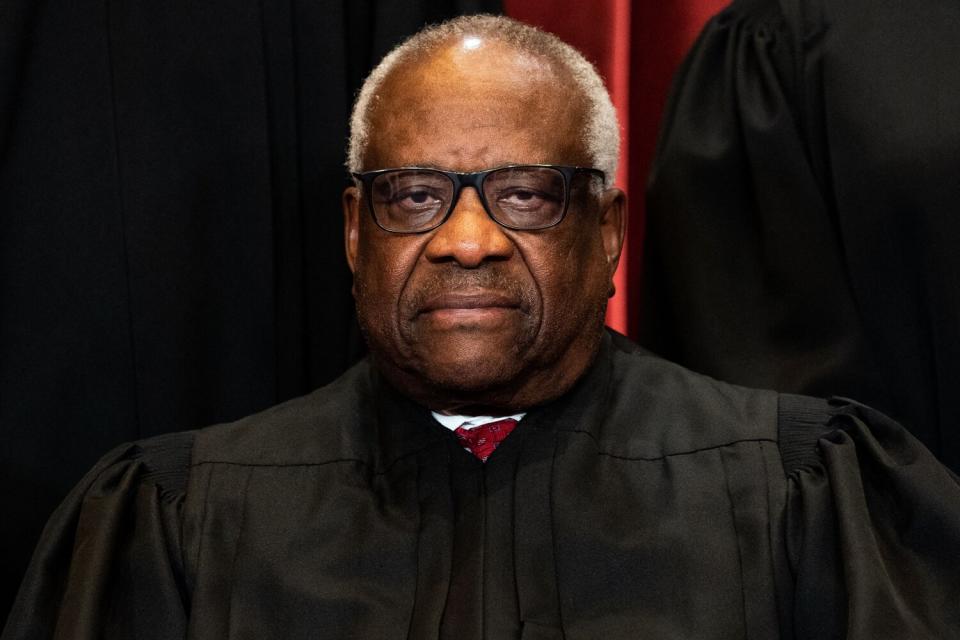In Concurring Opinion, Justice Clarence Thomas Writes Court 'Should Reconsider' Rulings Legalizing Gay Marriage and Birth Control
Conservative Justice Clarence Thomas' opinion in the overturning of Roe v. Wade suggests other landmark rulings — including those that protect contraception, same-sex relationships, and same-sex marriage — could be in peril.
Clarence Thomas writes, in a concurring opinion excerpted on Twitter, that the Supreme Court should reconsider Griswold v. Connecticut, Lawrence V. Texas, and Obergefell v. Hodge — the rulings that currently protect the right to buy and use contraceptives without government restriction, the right to a same-sex relationship, and the right to same-sex marriage.
From Thomas' concurring opinion: "... in future cases, we should reconsider all of this Court's substantive due process precedents, including Griswold, Lawrence, and Obergefell. Because any substantive due process decision is 'demonstrably erroneous,' ... we have a duty to 'correct the error' established in those precedents..."
Jim Obergefell, one of the plaintiffs in the historic Obergefell v. Hodge case, said in a statement sent to PEOPLE that Thomas is "not the Supreme Deity."
"Clarence Thomas is a Supreme Court justice appointed by humans, he is not the Supreme Deity. The millions of loving couples who have the right to marriage equality to form their own families do not need Clarence Thomas imposing his individual twisted morality upon them. If you want to see an error in judgment, Clarence Thomas, look in the mirror."

ERIN SCHAFF/POOL/AFP via Getty Images Clarence Thomas
Following a leaked draft opinion overturning Roe, lawmakers have hypothesized about the possibly of the court overturning other landmark rulings.
At a May fundraiser for the Democratic National Committee in Chicago, President Joe Biden said of the leaked opinion: "It's not just the brutality of taking away a woman's right to her body ... but it also, if you read the opinion ... basically says there's no such thing as the right to privacy."
Biden continued: "If that holds ... mark my words: They are going to go after the Supreme Court decision on same-sex marriage."
The decision to overturn Roe v. Wade was officially announced Friday, a month after a 98-page opinion obtained by Politico — allegedly authored by Justice Samuel Alito and leaked to the press in a major breach of confidentiality — stated that "Roe was egregiously wrong from the start," and that "we [the Supreme Court majority] hold that Roe and Casey [another ruling on the right to abortion from 1992 which upheld the previous court decision] must be overruled."
The draft document, labeled as the "Opinion of the Court," also said, "It is time to heed the Constitution and return the issue of abortion to the people's elected representatives."
The process of overturning Roe v. Wade began when Mississippi's ban on abortions after 15 weeks was struck down by a federal court. The state then asked the Supreme Court to either overturn Roe v. Wade or allow states to pass pre-viability abortion bans. Oral arguments were heard in December.
Twelve states in the country, including Mississippi and Texas, have "trigger" laws in place that go into effect once Roe is overturned. More states are likely to follow suit, as Elizabeth Nash, state policy analyst at the Guttmacher Institute, a research group focused on abortion rights, told PEOPLE earlier.
"And that would make it very hard for a large percentage of women in the country to access abortion care in their own state. It means a lot more people would have to travel for care," Nash said. "And the people who are most impacted by these abortion restrictions and bans are people of color, low-income individuals, young people and LGBTQ individuals — people who are already burdened with insufficient access to healthcare."
There are efforts to maintain the right to abortion in other states such as New York, Hawaii, California and Washington, which have statutory protections for abortion rights in their laws.


